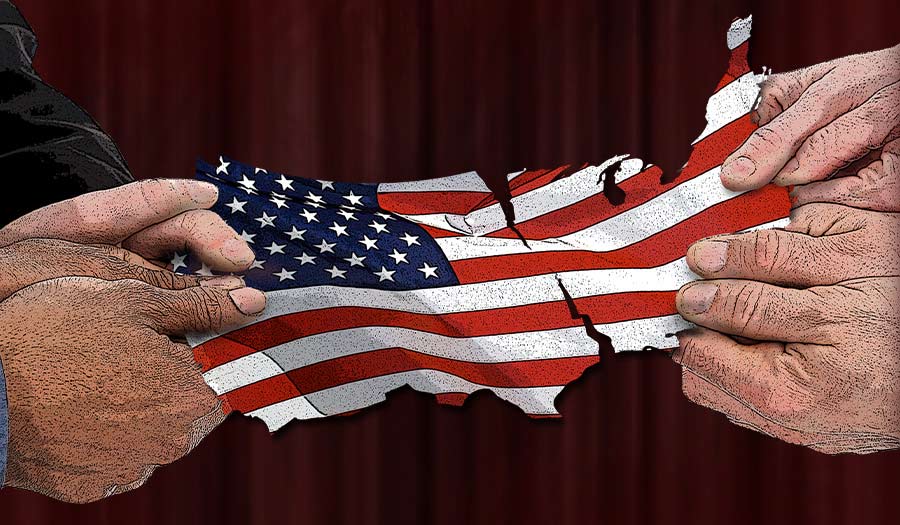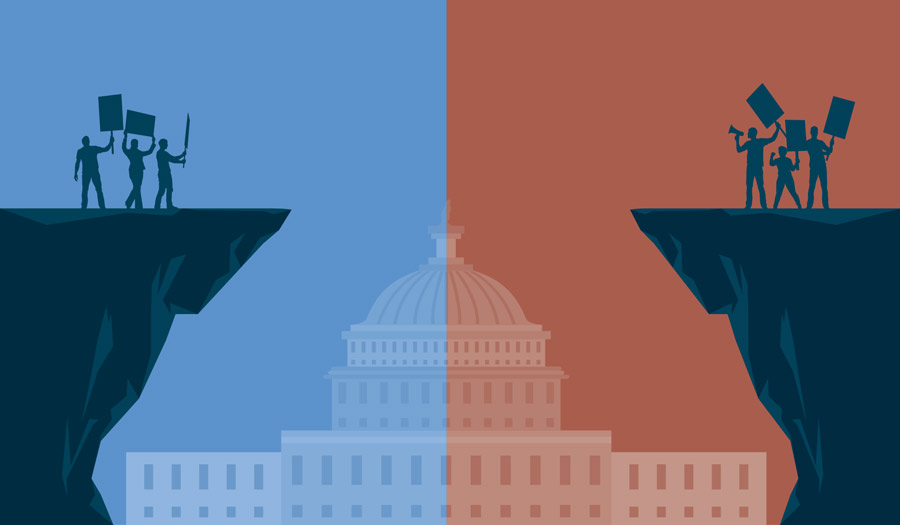 Paula C. Rondeau/The Real Truth
Paula C. Rondeau/The Real Truth
Article
Learn the why behind the headlines.
Subscribe to the Real Truth for FREE news and analysis.
Subscribe NowAmericans’ outlook on the national economy has improved somewhat from its lowest points during the early weeks of the coronavirus pandemic, but a recent poll suggests Democrats and Republicans are living in alternate economic realities amid the sharpest recession in the nation’s history.
Eighty-five percent of Democrats call economic conditions “poor,” while 65 percent of Republicans describe them as “good” in a survey conducted by The Associated Press-NORC Center for Public Affairs Research.
This divide reflects the deep polarization ahead of the 2020 presidential election, as well as a series of indicators that point toward a weakened but recovering U.S. economy.
The poll highlights yet another symptom of the nation’s ever-widening political divide.
Political Divide
“The economy is in terrible shape and improving rapidly,” said Harvard University professor Jason Furman, formerly the top economist in the Obama White House. “Depending on which of the two halves you’re looking at, you’re going to have a very different interpretation of where we are.”
Americans can see reasons for hope as well as doubt. They face a host of uncertainties about the path of COVID-19, the fate of small businesses with fewer customers and the status of additional government aid.
Overall, 63 percent of the country says the economy is in poor shape, down somewhat from the 70 percent who felt that way in May. The change was driven by increasingly optimistic Republicans, only 43 percent of whom described the economy as good a month ago. Two-thirds of Republicans, but just 29 percent of Democrats, expect improvement over the next year.
Thelma Ross, 78, of Granby, Missouri, believes the economy will recover if President Donald Trump can defeat Democratic challenger Joe Biden, the former vice president.
“I think it’s going to come back, stronger than ever, if we get the right president in,” Ms. Ross said. “President Trump is a businessman.”
Yet she is concerned by the protests after Minneapolis police killed George Floyd and the calls to remove statues with ties to the Confederacy. Ms. Ross views division as harmful for any economic recovery.
Economic Divide
The survey finds that African Americans and Hispanics are more likely than white Americans to say someone in their household has lost a job or other income.
Overall, 66 percent of Hispanic Americans and 53 percent of black Americans say they have experienced some form of household income loss, including layoffs, unpaid time off and cuts in hours or pay. Forty-two percent of white Americans say the same. Thirty-four percent of Hispanics, 29 percent of African Americans and 20 percent of white Americans said someone in their household has been laid off.
The poll finds signs that some of those layoffs are becoming permanent. Among all those who experienced a layoff in their household, 55 percent say the job definitely or probably will return—and 8 percent say it already has. Still, 36 percent said the job will most likely not come back, which is significantly higher than the 20 percent who said that in April.
The economy cratered in March and April as people sheltered in place in hopes of stopping the pandemic, and the unemployment rate spiked to at least 14.7 percent. Responses to government surveys suggested the true jobless rate may have been even higher. But it showed signs of reviving in May. Retail sales surged 17.7 percent, and 2.5 million jobs were added. The unemployment rate improved to 13.3 percent, a number that is still the second highest reading in records going back to 1948.
Leah Avery, 54, lost her job driving a school bus in suburban Dallas. She said she checks her email daily to find out how schools will reopen. She applied for unemployment benefits a month ago, but the request has been under review.
“It’s a struggle day by day for us to pay our bills, and I know others are going through the same thing,” she said.
The job loss has only added to her stress. Her aunt died from COVID-19, and she needs to take care of her elderly mother and her husband, who has dialysis appointments three days a week. It is a full-time job with no pay, she said.
“I just have these moments where it makes me cry,” she said. “You don’t know this day from the next day what is going to happen.”
The nearly $3 trillion in approved federal aid has shielded many people from the pain of the downturn. About two-thirds of Americans still call their personal financial situations good.
Two Worlds, One Nation
So how did the U.S. get here? How did we get to the point where many are living in alternate economic realities?
The answer lies in tying many social identities to politics. Understand. Everyone has a series of identities that make up who they are. Two common ones are religion and race.
Yet these separate identities have become increasingly in line with political platforms.
In 2014, a Pew Research Center study found: “The overall share of Americans who express consistently conservative or consistently liberal opinions has doubled over the past two decades from 10% to 21%. And ideological thinking is now much more closely aligned with partisanship than in the past. As a result, ideological overlap between the two parties has diminished: Today, 92% of Republicans are to the right of the median Democrat, and 94% of Democrats are to the left of the median Republican.”
Put simply, the two parties are speeding away from each other in opposite directions. And realize this was before the contentious 2016 presidential election and most of President Trump’s first term. The gulf between liberals and conservatives has only grown since!
While Democrats and Republicans continue to drift further apart, partisan animosity is also rapidly increasing.
Scientific American explained what is occurring: “U.S. liberals and conservatives not only disagree on policy issues: they are also increasingly unwilling to live near each other, be friends, or get married to members of the other group.”
A 2018 paper published in Annual Reviews framed the situation this way: “Democrats and Republicans both say that the other party’s members are hypocritical, selfish, and closed-minded, and they are unwilling to socialize across party lines, or even to partner with opponents in a variety of other activities.”
This means many in the nation are retreating to what Pew called “ideological silos” and only listen to those who share their viewpoints. The result is a liberal and conservative can look at the exact same data, news reports, video footage, etc., and come to wildly different conclusions.
Many Americans seem to be not just living in different economic realities, but entirely different dimensions in regards to the problems facing the nation and how to address them.
The whole situation calls to mind the question from the biblical prophet Amos: “Can two walk together, except they be agreed?”
The answer is an obvious no!
Abraham Lincoln’s words are also instructive for what is going on today in the U.S.: “A house divided against itself cannot stand.”
Lincoln was actually quoting the words of Jesus Christ: “Every kingdom divided against itself is brought to desolation; and every city or house divided against itself shall not stand” (Matt. 12:25).
The Bible has a lot more to say about division—and how to solve it. Read America’s Unbridgeable Political Divide to understand exactly what is driving U.S. citizens further and further apart.
This article contains information from The Associated Press.
- Real Truth Magazine Articles
- AMERICAS
 America’s Unbridgeable Political Divide
America’s Unbridgeable Political Divide


